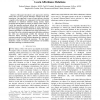Free Online Productivity Tools
i2Speak
i2Symbol
i2OCR
iTex2Img
iWeb2Print
iWeb2Shot
i2Type
iPdf2Split
iPdf2Merge
i2Bopomofo
i2Arabic
i2Style
i2Image
i2PDF
iLatex2Rtf
Sci2ools
IROS
2008
IEEE
2008
IEEE
Towards a cognitive robot that uses internal rehearsal to learn affordance relations
—This paper introduces a new approach to develop robots that can learn general affordance relations from their experiences. Our approach is a part of larger efforts to develop a cognitive robot and has two components: (a) the robot models affordances as statistical relations among actions, object properties and the effects of actions on objects, in the context of a goal that specifies preferred effects and outcomes, (b) to exploit the general-knowledge potential of actual experiences, the robot engages in internal rehearsal by playing out virtual scenarios grounded in yet different from actual experiences. To the extent the robot accurately appreciates affordance relations, the robot can autonomously predict the outcomes of its behaviors before executing them. Internal rehearsal-based outcome production in turn facilitates planning of a sequence of behaviors toward successful task execution. We also report simulation results of internal rehearsal-based traversability affordance learn...
| Added | 31 May 2010 |
| Updated | 31 May 2010 |
| Type | Conference |
| Year | 2008 |
| Where | IROS |
| Authors | Erdem Erdemir, Carl B. Frankel, Kazuhiko Kawamura, Stephen M. Gordon, Sean Thornton, Baris Ulutas |
Comments (0)

